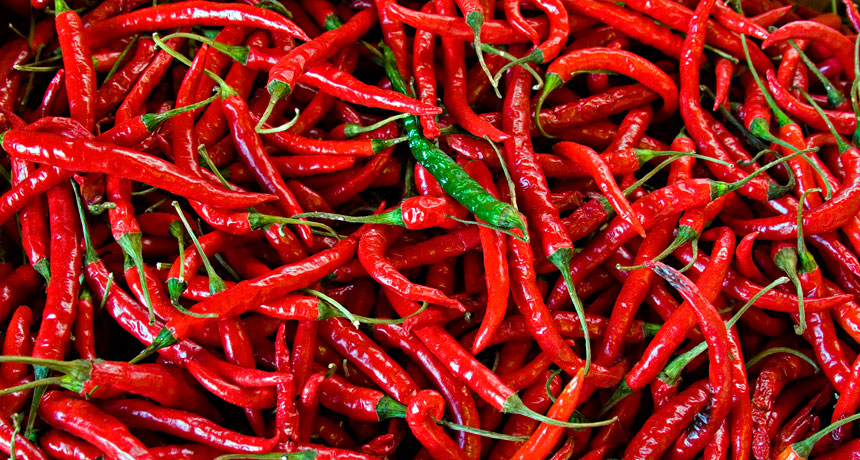It’s standard for spicy food to cause your upper lip to sweat, your nose to run, and your mouth to feel like it’s on fire. But can eating hot peppers mess with your health post-meal? The question is worth considering, especially as the ALS Pepper Challenge (AKA the Ice Bucket Challenge 2.0) gains popularity.
Stars like Kelly Clarkson and Shaquille O’Neal have been spotted swallowing spicy stuff for the challenge, which aims to raise awareness and funds for the neurodegenerative disease. But while we watched them struggle to chomp on crazy hot peppers, we couldn’t help but wonder: What makes chilies so darn fiery and are they even safe to nosh on in excess? Here, we pepper nutritionist Wendy Bazilian, DrPH, with all our burning questions. Read the below before you eat a heap of habañeros.
What makes peppers so hot?
The main compound that gives chilies their signature kick is a phytonutrient called capsaicin. “Capsaicin attaches to the receptors on the taste buds that detect temperature and sends signals of spicy heat to the brain,” explains Bazilian, who’s also the author of Eat Clean, Stay Lean.
The amount of heat a pepper packs has to do with the level of capsaicin it contains. To figure out how spicy a certain type of hot pepper is, adventurous eaters can refer to the Scoville scale, which ranks varieties from most to least spicy based on their capsaicin concentration. The scale ranges from standard bell peppers that have no capsaicin to ghost peppers and the Trinidad scorpion–the spiciest chilies around.
Dangers of eating hot peppers
“It’s a bit of a myth that hot peppers can actually create physical damage to the esophagus or tongue,” says Bazilian. But that doesn’t mean there are no dangers associated with noshing on fiery foods. Why? When we eat very hot peppers, the brain receives “pain” signals that can result in an upset stomach, nausea, or vomiting, says Bazilian. The stomach reacts as if you’ve consumed a toxic substance and works to release whatever was just eaten–i.e. spicy peppers–stat.
“If vomiting occurs, the acid that comes up from the stomach can irritate the esophagus,” explains Bazilian. Depending how hot a pepper is, that irritation can cause serious damage. Back in October 2016, one man actually burned a hole in his esophagus after consuming (and subsequently retching) ghost peppers during an eating contest. Other potential reactions to eating super-spicy peppers include numbness and breathing difficulties.
Health benefits of hot peppers
To complicate things, eating hot peppers can also deliver health benefits. Research suggests that certain capsaicin-rich ingredients, like cayenne pepper, can help eaters slim down by curbing appetite and revving the body’s calorie-burning abilities. What’s more, cayenne has also been shown to help clear sinuses, ease pain, and curb the growth of some bacteria.
To reap the benefits of hot peppers, choose varieties that aren’t too high on the Scoville scale and consume them in tasty meals, rather than straight up. “This way the impact on the tongue, esophagus, and stomach is less, too,” says Bazilian.
And if you’re planning on entering a hot pepper eating contest or taking the ALS Pepper Challenge, remember this: “When we consume things that aren’t appetizing to us and in quantities that are unreasonable, the possibility for adverse outcomes and discomfort are very real,” says Bazilian. Consider yourself warned.












